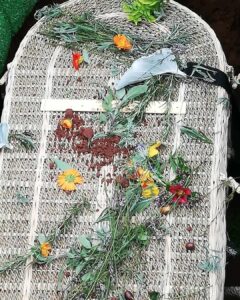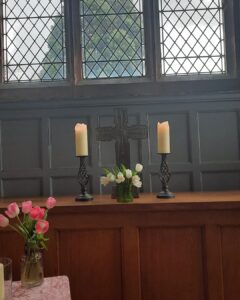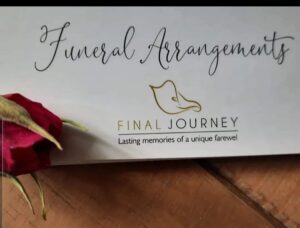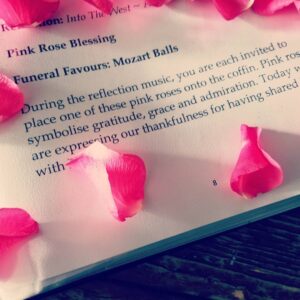Although funeral celebrants and funeral directors both work in the same field of bereavement, their roles are distinctly different.
A funeral director oversees the logistics and legalities of the funeral process. They receive the body and prepare it both for viewings and for the time of committal. They manage the logistics required by law to bring a body to its resting place.
The celebrant’s role (explained in detail below) is to oversee the ceremony. The celebrant is subcontracted (but not employed by) the Funeral Director.
One of the roles of the funeral director is to ascertain if the chief mourner or their loved ones hold any particular faith. This will then guide the funeral director in recommending the right person to officiate the ceremony. E.g. a priest, minister, ordained celebrant, independent celebrant, *humanist.
Oftentimes, families will say they want a humanist (simply because they don’t go to church). In my experience, most people carry some sort of faith or belief that has nothing to do with religion. This careful listening, on the part of the celebrant, will ensure the family has just the right tone to their ceremony.
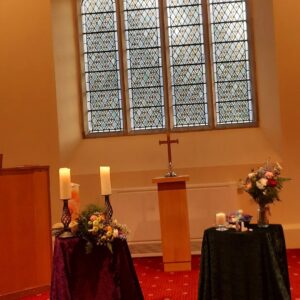
Creating sacred space in the beautiful burial chapel at Carlisle Cemetery. Image by Veronika Robinson
A (good) funeral celebrant spends a lot of time getting to know the family and their loved one. This includes the family meeting (two to three hours) and the creating of the ceremony itself. The celebrant’s role also includes ordering music via a third-party system called Wesley or Obitus (if the ceremony is in a crematorium). They may have to order a link for viewers to watch on Livesteam and to arrange a photo or video tribute. They will be required to send through the Order of Service to the funeral director (who will then arrange to have it printed). The family may also ask us to select an appropriate poem or reading for the ceremony.
Writing the eulogy (as opposed to a tribute) is a major part of a celebrant’s role and can take many hours. It is our pleasure and privilege to reminisce about your loved one. My preference is to engage in biographical storytelling and share their life in a way that is beautiful and meaningful rather than simply reading a list of statistics such as “Jack Smith was born on the first of June 1929. He went to…school.” A tribute is a personal reflection written by a friend or family member that either they read out or ask the celebrant to do on their behalf. A eulogy and a tribute are two different things. The eulogy is the overarching life story. A tribute is a reflection of the relationship between a person and the one who has died.
If I’m asked to officiate in a chapel that doesn’t have its own sound system, I will bring a lapel mic and amplifier. So that a celebrant doesn’t sound like they’re just reading, and so they can maintain maximum eye contact with the audience, many hours go into rehearsing the ceremony script. Although the ceremony itself may only be 20 to 30 minutes in length, the amount of celebrant investment is about 10 to 15 hours (meeting, creating, rehearsing, officiating, travel, being at the venue half an hour early).
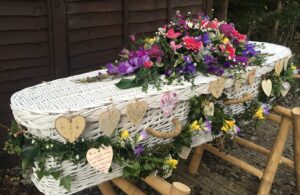
A personalised funeral ceremony. Image courtesy of Funeral Director Tracy Lazonby https://www.finaljourneyfunerals.co.uk/
Each celebrant has a different working style, but what they should all share in common is a desire to create a beautiful bespoke ceremony. To this end, they should not use a questionnaire with the intent of the family writing all the information for the eulogy. Gathering memories is a co-creative process which takes time and care.
The Funeral Director must ensure they know all the legal requirements for their role. These are to do with permits and compliance. When working with a family, they will gather details to do with venue choice, transportation, subcontracting to other bereavement suppliers, such as florists. They are tasked with caring for the body and bringing it safely to the ceremony venue.
As a bereavement celebrant, my role is to meet with the bereaved (next of kin) and learn about their loved one so that I can create, write and present a ceremony that is true to their wishes and values (of the family and of their loved one). The role is a varied mix of listener, creator, storyteller, designer, ritualist, and holder of space. I consider myself Guardian of the Threshold. That is, I am here to walk alongside the bereaved on their journey through the liminal space of saying goodbye.
One thing that is slowly changing in the funeral industry is allowing families to have freedom in their choices. This includes transparency on the part of the Funeral Director, so that the chief mourner knows (at all times) about relevant costs and options. When organising a funeral, there are between 80 and 300 decisions which have to be made. This is overwhelming for families and uses a part of the brain which has no place in the emotions of grieving. Those who work in the field of bereavement should, by nature, have a strong sense of empathy.
As a celebrant, my services are far reaching: traditional funerals, alternative funerals, cremation services, burials, eco-burials, spiritual goodbyes, child funerals, suicide bereavements, family-led ceremonies, celebration of life, living funerals, memorials and more. As the Holder of Space, I am there to receive all the love, laughter, sorrow and sadness, memories and more from each family I serve. These connections are deep and meaningful, and when I work again with a family (on subsequent bereavement/s) this becomes even more so. The most important thing to remember when working with a celebrant, is that they are accompanying you on your journey and will advocate for you no matter what your choices: unconventional, traditional, sacred, dynamic, fun, tender, spiritual or humanist.

Celebrant’s view: When these seats are filled, it is our job to ‘hold the space’ and steady the journey. Image by Veronika Robinson
Veronika Robinson has been officiating all manner of ceremonies since 1995. She has a Master’s Degree in Creative Writing from University of Cumbria, and is the author of over thirty books, including several for celebrants: The Five Elements; The Successful Celebrant; Write That Eulogy; Funerals for Children; The Discrimination-free Celebrant.
She is a certified Infant Loss Professional; founder of Penrith’s first Death Café; has a TQUK Level 2 Certificate in Self-harm and Suicide Awareness and Prevention; is a celebrant for the charity Gift of a Wedding; mentors celebrants around the world in all aspects of celebrancy, including mastering writing life stories and love stories; and hosts retreats for celebrants. Veronika founded and edited The Celebrant magazine. Issues 1 to 13 can be found here. Alongside her husband Paul www.paulrobinsonvoicecoaching.co.uk , they are industry leaders offering one-to-one professional celebrant training.


